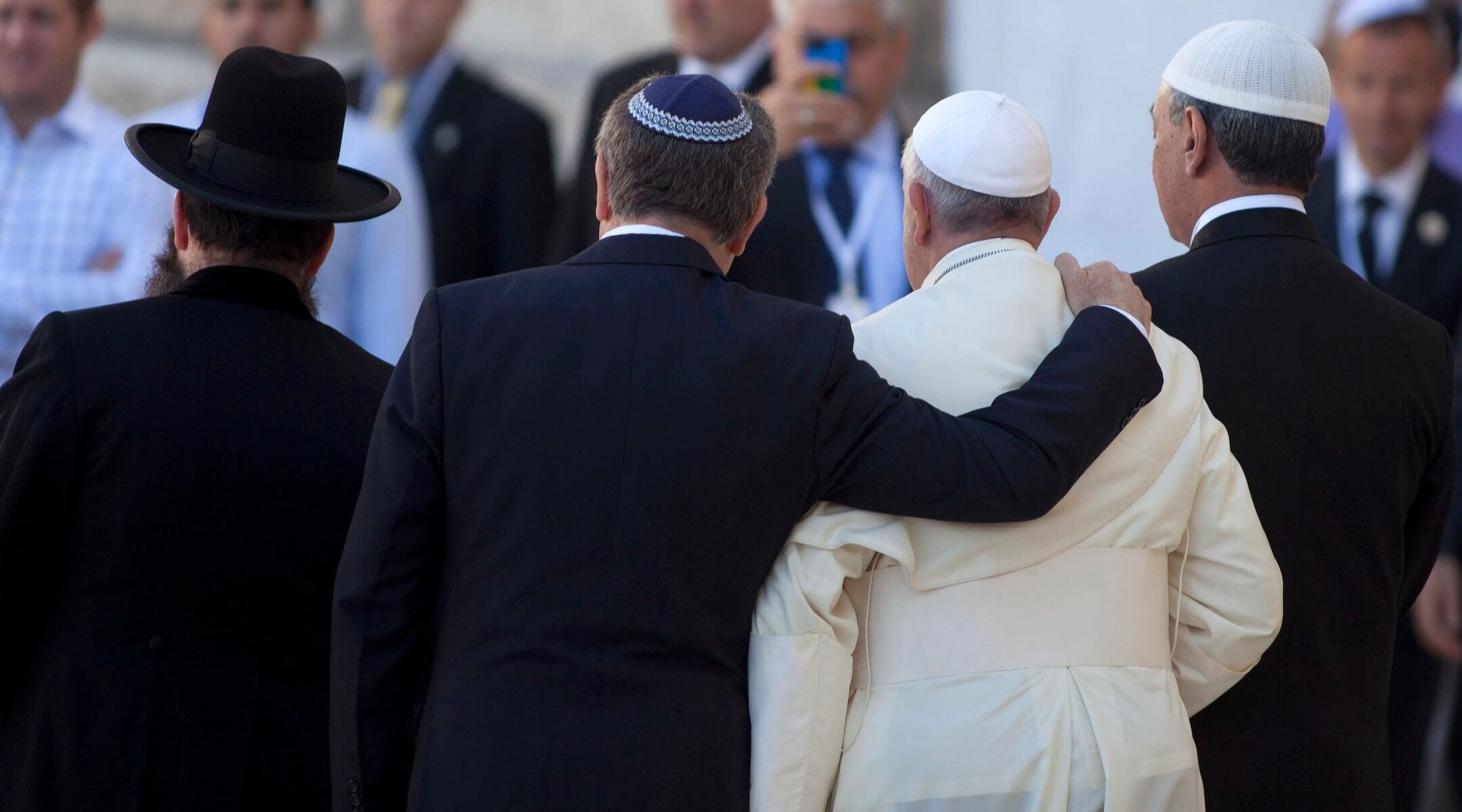Christian churches are urged to act against antisemitism, including by scrutinizing their own practices
The Council of Centers on Jewish-Christian Relations said it was alarmed by the possible “normalization of antisemitism in American discourse.”

Pope Francis and Rabbi Abraham Skorka leave the Western Wall compound, after the pope prayed at the Wall in Jerusalem, Israel, May 26, 2014. Photo by Getty Images
(JTA) — A group of educators dedicated to solidarity between Christians and Jews is urging churches to take action against the growing prevalence of antisemitism in the United States — and to reflect on how their own practices may be fueling hatred against Jews.
“We implore all churches to redouble their efforts to denounce antisemitism publicly as antithetical to the very essence of Christianity itself,” the Council of Centers on Jewish-Christian Relations, which represents about 30 institutions working on interreligious understanding, said in a public statement issued last week.
Published during Advent, the season of preparation ahead of Christmas, the statement opens by declaring that “the United States is facing the greatest crisis of public antisemitism in a century.”
Blame for the crisis rests on entertainers, athletes and politicians who vilify Jews and spread antisemitic tropes and conspiracy theories on the internet, according to the statement, which also calls out self-described Christian nationalists advocating for hatred against Jews. The spread of antisemitism is manifesting in attacks on Jews on social media, in the streets and at synagogues, according to the group.
In explaining what triggered the statement, the group said it was “increasingly alarmed that we may be witnessing the normalization of antisemitism in American discourse, which recalls events that happened in Germany when the Nazis rose to power in the 1930s.”
The Anti-Defamation League, which records antisemitic incidents, said its most recent annual tally saw a 34% increase between 2020 and 2021, reaching an all-time high. A 2021 survey by the American Jewish Committee found that an estimated 40% of American Jews changed their behavior over the preceding year because of fear of antisemitism.
CCJR’s statement calls on Christian clergy and educators not only to denounce antisemitism but also to examine how they might be inadvertently promoting antisemitic ideas.
“As students of history, we know that the roots of modern antisemitism and associated conspiracy theories grew out of Christian libels perpetuated against Jews in medieval Europe and out of centuries of Christian religious teaching of contempt for Jews,” the statement says.
Christian theology has evolved since the Holocaust and most denominations have long disavowed antisemitic teachings, including the idea Jews are responsible for killing Jesus and that he represents the negation of Judaism.
But, the CCJR statement says, remnants of this problematic thinking can persist, requiring caution from Christian leaders.
“We entreat the churches to look inward by examining their preaching, teaching, and theologies to eliminate any traces of anti-Jewish sentiments and look outward to act and speak against all forms of antisemitism they encounter,” the statement says.
The group’s letter follows initiatives in some of the world’s largest Christian denominations to address antisemitism in their liturgy and history. Earlier this year, the Episcopal Church announced that it would review pre-Easter readings that blame “the Jews” for the death of Jesus and offered an alternative to them. Meanwhile, Pope Francis restricted the use of the Latin Mass, a traditionalist liturgy that includes a prayer for the conversion of Jews, out of concern that it was being used by those who did not accept the Catholic Church’s 1965 statement declaring that the Jews were not responsible for Jesus’ death; he has condemned antisemitism. And the Church of England recently apologized to Jews for the antisemitic laws that led to their expulsion 800 years ago.
This article originally appeared on JTA.org.














